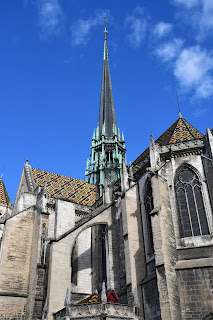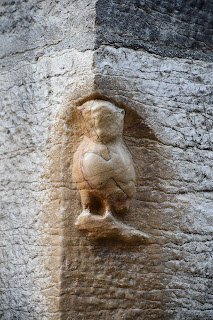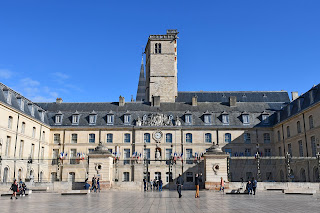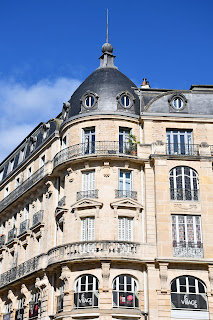Dijon and Lyon
For a normal person, a trip from Ferney-Voltaire to Dijon might take about three and a half hours on a good day. I, however, am an anxious anchovy, and connecting times below ten minutes scare me. I would much rather wait at a train station for twenty minutes than fret about having to buy tickets and find the right platform in the time it takes to boil an egg.
This is why my journey
to Dijon did not take three and a half hours but closer to four. I woke up at
4:50 and after getting ready, I loitered around the Mairie bus stop while
watching people set up for the weekly farmer’s market. My extra budgeted time
came in handy, as about three minutes later a man came up to me and told me
that because the market was blocking the roads, the bus would not arrive at my stop.
He told me to walk down to the next stop, but rather than walking I half-ran (as
it turned out, unnecessarily: the bus had a significant delay). Nevertheless, I
arrived at the airport in good time and bought my shockingly expensive ticket
to Lausanne at a leisurely pace. I then sat in the stationary train for ten
minutes, placidly masticating on my baguette and individually wrapped pieces of
camembert before finally departing.
Once again, I could
have planned to leave on an earlier train from Lausanne to Dijon, but I did not
want to do things in a rush. This was a stroke of scheduling luck. That’s
because when I arrived in Lausanne, the ticket machine I wanted to use decided
not to cooperate. Had I only a short window to make this transfer, I am not
sure what I would have done. Fortunately, this was not the case, and so I walked
unhurriedly to the ticket office where I procured a one-way ride to Dijon. Since
I had to present my ID, I imagine the reason why I could not buy a ticket from
the machine is they are not in the business of verifying identities.
The ride from Lausanne
to Dijon was exceedingly comfortable even in second class. The train had big,
assigned seats, charging ports, and WiFi, and moved as smoothly as a knife
through butter. I daydreamed about pretending to fall asleep and making it all
the way to Paris, but my rational side got the better of me. I am glad it did,
for I would not have been awake to see a herd of chamois just before the Swiss
border. I alighted from the train in Dijon at half past nine, as planned.
Dijon is a relatively
small city for French standards, boasting around 150 thousand inhabitants. In
most of the world, it is known for its mustard, and even after visiting Dijon I
do not know much more about it than that. I have, however, learned that Dijon
is also known for wine, being the capital of the historical Burgundy district.
Thus, the city could rightly crown itself queen of liquid comestibles, but it
does not because that would be silly. Nor does it call itself the queen of
colours after mustard yellow and burgundy red. Indeed, there are not even all
that many mustard or wine shops (and no mustard wine shops), which seems like a
missed opportunity.
My itinerary in Dijon
first took me to the Burgundy Theatre, an imposing, church-like structure built
of the same cream-coloured stone as many other buildings in the city. I then
looped back and visited the Cathedral of Saint Benignus. The place of worship
is remarkable both for being named after a rather niche saint as well as for
having colourful roof-tiles and octagonal towers.
Just north of the
cathedral stands William Gate, a pocket-sized version of the Arc de Triomphe.
From there, the main artery of the city pulsates to the east, so it is a
mystery to me how I ended up drifting northwards yet again to the Church of Our
Lady. This Notre-Dame houses quite a few grotesques and gargoyles of its own;
in fact, its front façade has three whole rows of them. The northern wall of
the church also displays a stone owl which is said to grant wishes to those who
touch it. It looks rather worn down, though, so I thought it best not to burden
it further. After completing the loop to Liberation Square with its magnificent
Ducal Palace, I began my walk back again to the train station.
Another instalment of
rage against the machine ensued when I found out all the 2nd class
seats on the train to Lyon had been sold out, after which I spent five minutes
hammering in personal data for no apparent reason. I will not go into my
subsequent lost wanderings around the train station, but suffice it to say that
I made it onto the train and had a quiet little lunch in the food wagon while a
neighbouring senior citizen poked me with his backpack.
The weather turned a
little cloudy in Lyon, so I spent much of the afternoon fiddling around with my
jacket. Since I have a whole day in Lyon tomorrow, I decided to take things at
a more leisurely pace. After reaching the peninsula that forms the centre of
town, I wandered around in a vaguely southern direction, stumbling across
various interesting places like the fountain on Place de Jacobins or the
multiple viewpoints across the Saône. By the time I reached Perrache Station,
however, I felt tired, so I took the tram all the way down to the Musée des
Confluences. There, I realised I did not really want to visit the museum, so I
took the tram back up again and rode the metro to Place Bellecour.
For the rest of the
afternoon, I set my course north-eastwards towards my hotel. I took a brief
pause to eat at a Vietnamese restaurant when it started to rain, but then
continued past the opera to the outskirts of the old town. Interestingly, it is
precisely on the outskirts that an even older town is located: the ruins of a
Roman colony. Lyon has a relatively run-down amphitheatre that was not
accessible when I visited, and it seems there are a few other remains linked to
the Roman era in the neighbourhood. Having made an unsatisfactory peek through
the fence, I set off again and walked through the Parc de la Tête d’Or to my
hotel.






































































Comments
Post a Comment